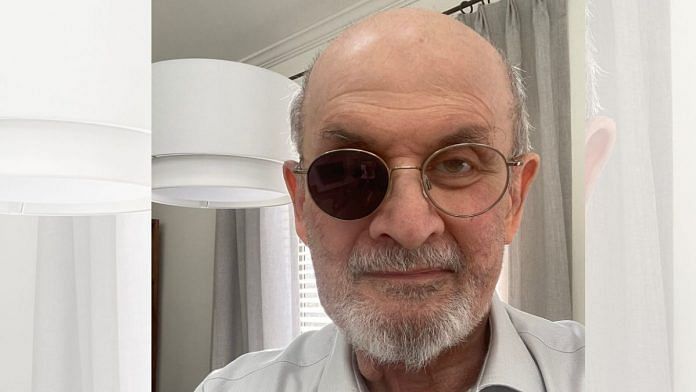New Delhi: Booker Prize-winning author Salman Rushdie is set to publish a memoir about the horrific assault that rendered him blind in his right eye and injured in his left hand in 2022, as the author was about to give a lecture at Chautauqua Institution in western New York.
The 256-page memoir titled ‘Knife: Meditations After an Attempted Murder’ is scheduled for release on 16 April and is his first book post the 2022 attack. It is scheduled to be published in the United States, along with over 15 other territories, by Random House, the imprint of Penguin Random House, which published his pre-attack novel ‘Victory City’ earlier this year.
“This was a necessary book for me to write. A way for me to take responsibility for what occurred and to respond to violence with art,” Rushdie said in a statement issued by Penguin Random House Wednesday.
His other works include ‘Midnight’s Children,’ which won the Booker Prize in 1981, ‘Shame,’ and ‘The Moor’s Last Sigh.’ Rushdie is also a well-known advocate for free speech and the former president of PEN America.
After Iran’s Grand Ayatollah Ruhollah Khomeini issued a fatwa in 1989 calling for Rushdie’s execution for alleged sacrilege in his novel ‘The Satanic Verses,’ the author lived in isolation and with round-the-clock security for a period of time. Prior to the assault at the Chautauqua Institution, he had been able to move about freely for several years.
After he was repeatedly stabbed in the neck and abdomen, the 76-year-old Rushdie was airlifted to a hospital, where he underwent surgery. His agent, Andrew Wylie, then stated that the author was on a ventilator with a severely damaged liver, severed nerves in his arm, and a probable loss of an eye.
The assailant was later identified by the police as 24-year-old Hadi Matar from Fairview, New Jersey. At the time of his detention, he was awaiting arraignment. Matar was born a decade after the publication of ‘The Satanic Verses.’
In his previous memoir, ‘Joseph Anton,’ published in 2012, Rushdie described his nearly decade-long period of concealment. The title is the pseudonym he used during the time period, which is a tribute to the authors Joseph Conrad and Anton Chekhov.
In 1998, the fatwa was rescinded, and Rushdie became a prominent public figure in New York and an advocate for free speech, serving for a time as president of PEN America.
‘Knife’ is a searing book and a reminder of the power of words to make sense of the unthinkable. “We are honoured to publish it, and amazed at Salman’s determination to tell his story, and to return to the work he loves,” said Penguin Random House CEO Nihar Malaviyya.
Rushdie is one of the most renowned and award-winning contemporary authors in the world. His 16 works of fiction have been translated into over 40 languages. He also received a knighthood in the Queen’s Birthday Honours in the UK in June 2007 and joined the prestigious Companions of Honour.
This year, in February, his new novel, ‘Victory City,’ written in the manner of an ancient epic, was published worldwide to widespread critical acclaim.
Rushdie did discuss his ordeal with The New Yorker in an interview with David Remnick in the February issue, where he elaborated that he had worked diligently to avoid “recrimination and bitterness” and was determined to “look forward and not backwards.”
He also stated that he was struggling to write fiction, as he had in the years following the fatwa, and that he was considering writing a memoir instead. Rushdie wrote extensively and in the third person about the fatwa in his 2012 autobiography, “Joseph Anton.”
In an interview with a magazine, Rushdie stated, “This does not feel third-person to me. When someone inserts a knife into you, I believe that is a first-person narrative. This is an ‘I’ narrative,” The New York Times reported.
Also read:



